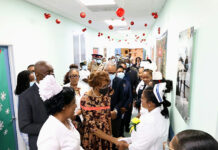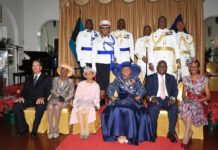Prime Minister elect David Thompson greets supporters as Kenneth Best, newly elected Member of Parliament for St. Michael East (left), offers his congratulations at DLP Headquarters this morning. (Photo by Barbados Advocate)
BRIDGETOWN, Barbados, – Another government in the Caribbean lost power, as the Democratic Labor Party leader David Thompson last night trounced incumbent Prime Minister Owen Arthur to make a historic return to government.
Barbadians sent a clear message in yesterday’s election, joining several other Caribbean nations in replacing their incumbent. Thompson’s party was leading 20-10 at night, marking a historic return to power for the DLP since 1994. Recounts were requested in two constituencies.
The incumbent Barbados Labor Party led by PM Owen Arthur, conceded defeat soon after. Arthur retained his seat, as did Mia Mottley. The DLP won several constituencies including St. Lucy, Christ Church South, St. Michael South Central, St. John, St. Phillips north and St. Michael Central.
The DLP has not been in office since 1994. It’s history is rich, tracing its roots to founder, Errol Barrow, who helped the party win its first general election in 1961, capturing 14 of the 24 seats in the Barbados House of Assembly after the island was granted full internal self-government.
By 1976, the DLP lost the post only to return with Barrow at the helm in 1986. Erskine Lloyd Sandiford replaced Barrow in 1997 following the premier’s death. But the DLP lost the election in 1994 and have been out of office ever since.
There were 235,475 eligible voters in the January 15th elections, with 15,000 of them registered for the first time. Thompson had reported some minor problems during Tuesday\’s voting, claiming there were reported instances of identification irregularities.
Prime Minister Owen Arthur was seeking an unprecedented fourth successive term in office. Polls had shown a BLP win and Arthur up to yesterday said he was `quietly confident` that his party had done much to regain the government.
A total of 68 candidates contested the poll, with the BLP and DLP putting up full slates of 30 candidates each. The other smaller parties – the People\’s Empowerment Party had four while the People\’s Democratic Congress had two. There were two independents.








